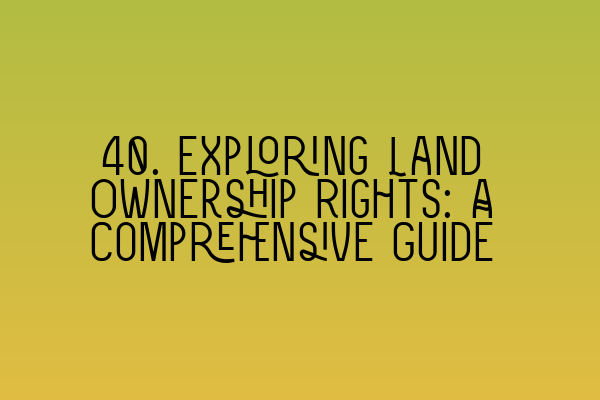Exploring Land Ownership Rights: A Comprehensive Guide
At SQE Property Law & Land Law, we understand the importance of understanding land ownership rights. Whether you are a property owner, a landlord, a tenant, or a real estate professional, having a comprehensive understanding of land ownership rights is crucial to navigating the complexities of property law.
In this guide, we will explore the various aspects of land ownership rights, providing you with valuable information that will help you make informed decisions and protect your rights. Let’s delve into the subject and demystify the intricate world of land ownership rights.
1. Introduction to Land Ownership Rights
Land ownership rights refer to the legal rights and privileges granted to individuals or entities regarding the ownership, possession, and use of land. These rights are essential for protecting the interests of property owners and ensuring the orderly and efficient transfer of property.
Understanding the different types of land ownership rights is imperative. Common forms of land ownership include freehold, leasehold, and commonhold. Each has its own set of legal characteristics and implications, which we will explore in detail.
2. Freehold Ownership
Freehold ownership is the most complete form of land ownership. When you own a freehold property, you have full and absolute ownership rights over the land and any structures on it. This means you have control over the land, and you can use, sell, or pass it on to future generations as you see fit.
It is crucial to understand the concept of freehold ownership, as it affects various aspects of property law, including planning permissions, property development, and inheritance rights. To learn more about freehold ownership, check out our dedicated article “SQE 1 Practice Exam Questions”.
3. Leasehold Ownership
Leasehold ownership is a form of land ownership where the property is leased for a specified period of time. In this arrangement, the land itself is owned by a freeholder, and the leaseholder has the right to occupy and use the property for the duration of the lease.
Leasehold ownership comes with certain rights and responsibilities, both for the leaseholder and the freeholder. It is essential to understand the terms of the lease and any associated agreements, as they can have significant implications on property use and future transactions. For more in-depth information on leasehold ownership, visit our article on “SQE 1 Practice Mocks FLK1 FLK2”.
4. Commonhold Ownership
Commonhold ownership is a relatively new form of land ownership introduced in the Commonhold and Leasehold Reform Act 2002. It allows for the collective ownership of a building or property, where each owner has a freehold interest in their individual unit while sharing common areas and facilities with other owners.
Commonhold ownership presents unique legal considerations, such as the management of common areas and the resolution of disputes among owners. To gain a comprehensive understanding of commonhold ownership, we recommend exploring our article on “SQE 2 Preparation Courses”.
5. Protecting Land Ownership Rights
It is essential to protect your land ownership rights to ensure the integrity of your property and safeguard your interests. There are various legal mechanisms and practices that can help you protect your rights, including land registration, easements, covenants, and restrictions.
Understanding these protective measures and how they can impact your land ownership rights is vital. To learn more about protecting land ownership rights, we recommend exploring our article on “SQE 1 Preparation Courses”.
6. Consulting a Property Law Expert
Given the complexities of land ownership rights and property law, it is highly beneficial to consult a property law expert when dealing with any issues or transactions related to land ownership. A qualified solicitor who specializes in property law can provide valuable guidance and ensure that your rights are protected.
If you require professional assistance or have any specific questions regarding land ownership rights or any other aspect of property law, please don’t hesitate to get in touch with our team at SQE Property Law & Land Law. We are always ready to provide expert advice and support to help you navigate through any property-related matter.
To stay updated with the latest legal developments and important dates related to the SQE exams, make sure to check out our article on “SRA SQE Exam Dates”.
We hope that this comprehensive guide has shed light on the essential aspects of land ownership rights. By understanding these rights and seeking professional advice when needed, you can make informed decisions and protect your interests in the intricate world of property law.
